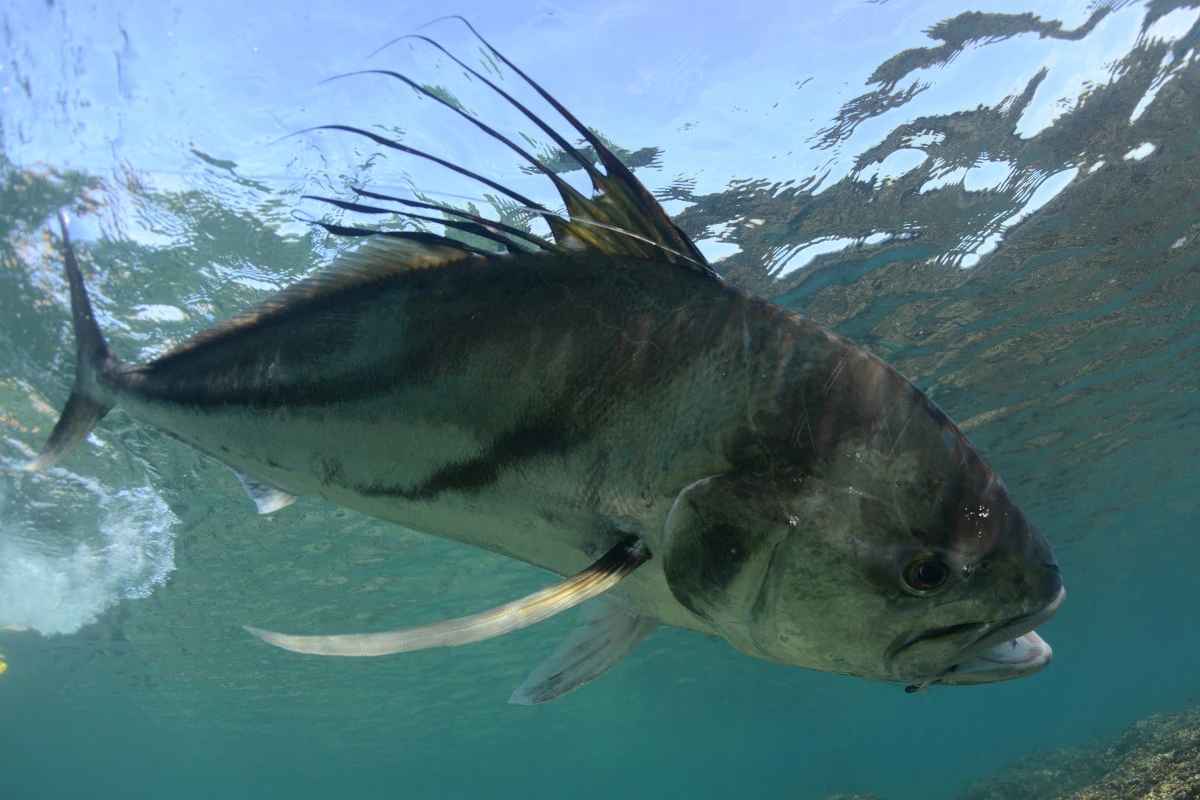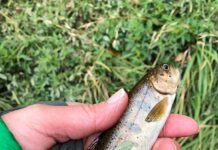The iconic roosterfish is something of a legend in saltwater angling circles. These unique game fish are known for their long dorsal fin spines that resemble a rooster comb. This inshore species has a minimal range. Almost the entire world’s population of roosterfish lives along the eastern Pacific Coast of Mexico down through Central America and a small portion of South America on the Ecuador, Peru, and Colombia coastline. Even though the fish live exclusively in shallow waters, scientists know little about the species beyond their essential habits. Roosterfish are unique because they are the only species in their genus and family. However, the roosterfish earned its reputation with anglers for being a fierce fighter, capable of some challenging line-peeling runs. The bigger specimens can reach upwards of 100 pounds, making for a formidable challenge for any angler.
The roosterfish is becoming slightly harder to find and catch as conservation efforts intensify for this species. Many anglers are now adding roosterfish to their bucket lists as one of the more unique fish one can catch while saltwater angling. Today we’ll look at what little we know about this species and discuss some ways you can experience their beauty and power for yourself firsthand.
The Little We Know About Roosterfish
Travis Smola
It might be easier to list the things we don’t know about Nematistius pectoralis than to document what we know. As mentioned, roosters are the only species in their genus and family. They have a unique swim bladder that connects to their inner ear. As a result, they have excellent hearing that comes in handy when they attack a wounded baitfish. Their diet is primarily small fish. Bonitos, sardines, blue runners, and mullets are all common parts of the diet. The fish prefer shallow waters just offshore, sometimes no more than 60 feet deep.
Unfortunately, that’s about the extent of our knowledge of the species. Not much is known about their total population numbers. Even less is known about their movements or spawning activities. However, the International Game Fish Association announced they would be trying to change that in July 2022 when they launched the IGFA Roosterfish Research Program. Their long-term goal is an assessment of the population’s size and structure. The two-year study also hopes to do genetic testing to learn more about their genes. The goal is to start making sport fishing and commercial fishing regulations recommendations for conserving the species.
Are Roosterfish Good Eating?

datmor via Getty Images
The roosterfish is a unique species treasured mainly for its extraordinary appearance and fighting abilities. As an eating fish, most people find they leave a lot to be desired. They have darker meat that isn’t super tasty in most instances. Like all things, it depends on how it’s prepared. However, you’ll find that most anglers want to practice catch and release, which isn’t a bad idea, considering we have no idea how many are out there.
Commercial fishers regularly target this fish in some countries. Others, like Costa Rica, which has taken a strong conservation stance in recent decades, protect them from harvest completely. Most captains there will ensure you get them back in the water in less than a minute to help ensure the best odds of survival. Just a quick photo, and then back in the water they go. Considering that they often occupy the same waters as tastier fish like snapper, that makes for more reasons to release them back into the wild, at least until we know more about the stability of their population.
How to Catch Roosterfish

FtLaudGirl via Getty Images
Because this is an inshore species, you can fish for roosters from a boat or the shore. Most anglers use dead or live bait and either go slow trolling or drift fish. It’s possible to catch them on jibs or other subsurface lures. However, most anglers who use artificial lures from large GT-style topwater poppers worked aggressively over the surface as quickly as possible. This can be done from shore or on a boat. Roosters are aggressive strikers, and using topwaters is easily the most exciting way to target them. Catching them from shore can be slightly more challenging and require Fly fishing them is also possible. Go for something significant resembling a mullet for the best results. Fly fishing usually doesn’t produce massive fish as traditional methods do. It depends on the fishery.
The more challenging aspect of targeting roosterfish is simply getting on them while the bite is on. When I spoke to Diego Camacho, the fishing director for Crocodile Bay Resort in Costa Rica, he told me roosters could be caught year-round. However, he also said the bite regularly fluctuates between hot and cold with almost no rhyme or reason. He can’t pinpoint the best time of year to target them.
“Honestly, we don’t have a specific time because the rooster bite sometimes seems to be on fire for like two weeks, and then it will calm down, and then it will go back up,” Camacho said. “It doesn’t happen at an exact time.”
For Camacho, a slow day of rooster fishing is one to five fish, while a good day may produce 10 to 25. However, the boats in his fleet have had great days where 30 to 35 fish are produced. It all depends on getting on that hot bite. When the bite is on, it makes for an action-packed day of angling.
Perhaps more important than the time of year or bait is the location. Central America seems to be a better fishery for roosters than anywhere else. Not that these fish cannot be caught at the extreme southern and northern parts of their range, but Panama and Costa Rica are the two central locations. However, the Baja California peninsula of Mexico is becoming an increasingly popular and accessible location to target them.
If you plan a trip to Mexico or Central America, we recommend hiring a charter boat. These men and women fish for roosters every day, and they will know exactly where to locate them. They’ll also have the ideal rigs and tackle setup for the situation without much trial and error. They can be a tricky species to target if you’ve never pursued them before. It’s all a matter of finding that perfect sandy bottom concentrating the baitfish, and the roosters should be nearby. In some cases, the roosters may be holding less than 50 yards from the beach, and other times they may be 150 yards offshore in a spot that’s near impossible to reach for surf anglers.
Roosterfish Records

IGFA via Getty Images
Speaking of Baja California, the peninsula is home to the all-tackle world record for roosterfish, as recognized by the IGFA. It’s a record that has stood for an incredibly long time. No one has been able to top Abe Sackheim’s 114-pounder that was caught in June 1960. That same fish holds the 30-pound weight class line record. The popularity of rooster fishing hasn’t slowed any, so the fact this fish has been able to hold off all challengers is quite impressive. Although we also may not see this record fall anytime soon due to many anglers being hesitant to kill a rooster of considerable size. Not that the length record is going to be any easier to catch. Panama produced the catch and release record in December 2019, a 136-cm beast caught by Chuck Bahan. That’s a sizeable rooster and likely a once-in-a-lifetime catch.
The rooster has proven to be a popular fish for line-class record seekers, with many categories filled. Many of the records, especially those for tippet class records, are probably breakable for an angler determined and patient enough to play such a robust species on lighter lines.
It’s not all about records with this species, either. The roosterfish has developed such a reputation that even landing a smaller fish is enough to make most anglers happy. It’s not an easy fish to check off your angling bucket list, but it is well worth the time and effort to capture and hold this fascinating species in hand at least once in your angling career.
For more outdoor content from Travis Smola, follow him on Twitter and Instagram. Check out his Geocaching and Outdoors with Travis YouTube channels for original videos.
READ MORE: COSTA RICA FISHING: EVERYTHING TO KNOW ABOUT THIS SALTWATER PARADISE
Related Videos
Credit: Source link































